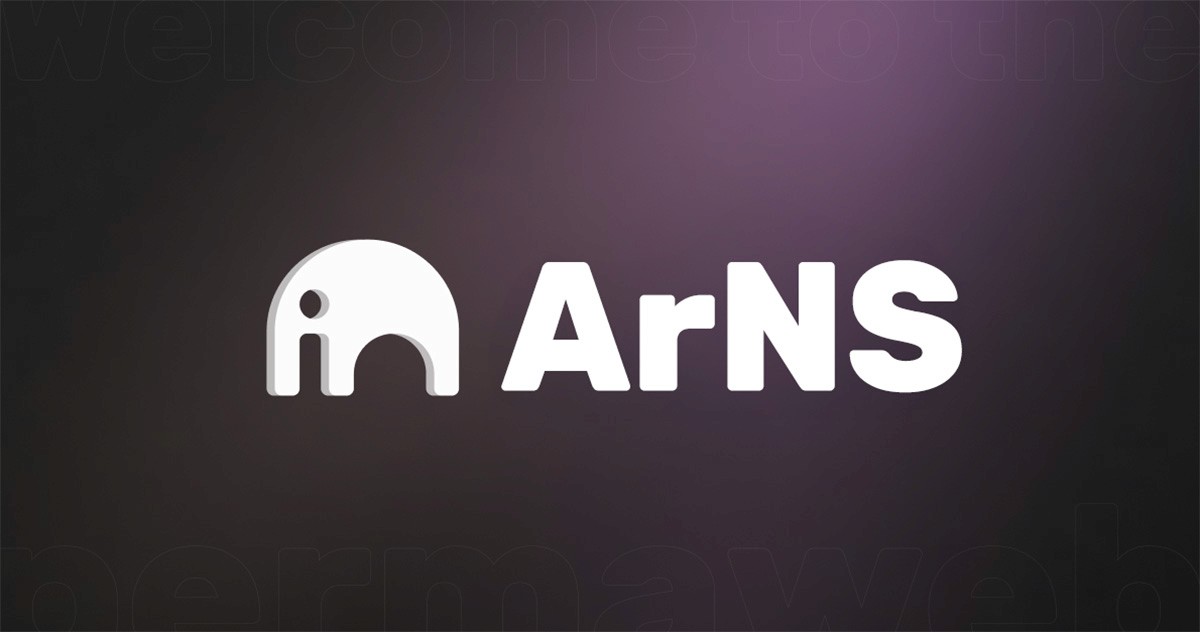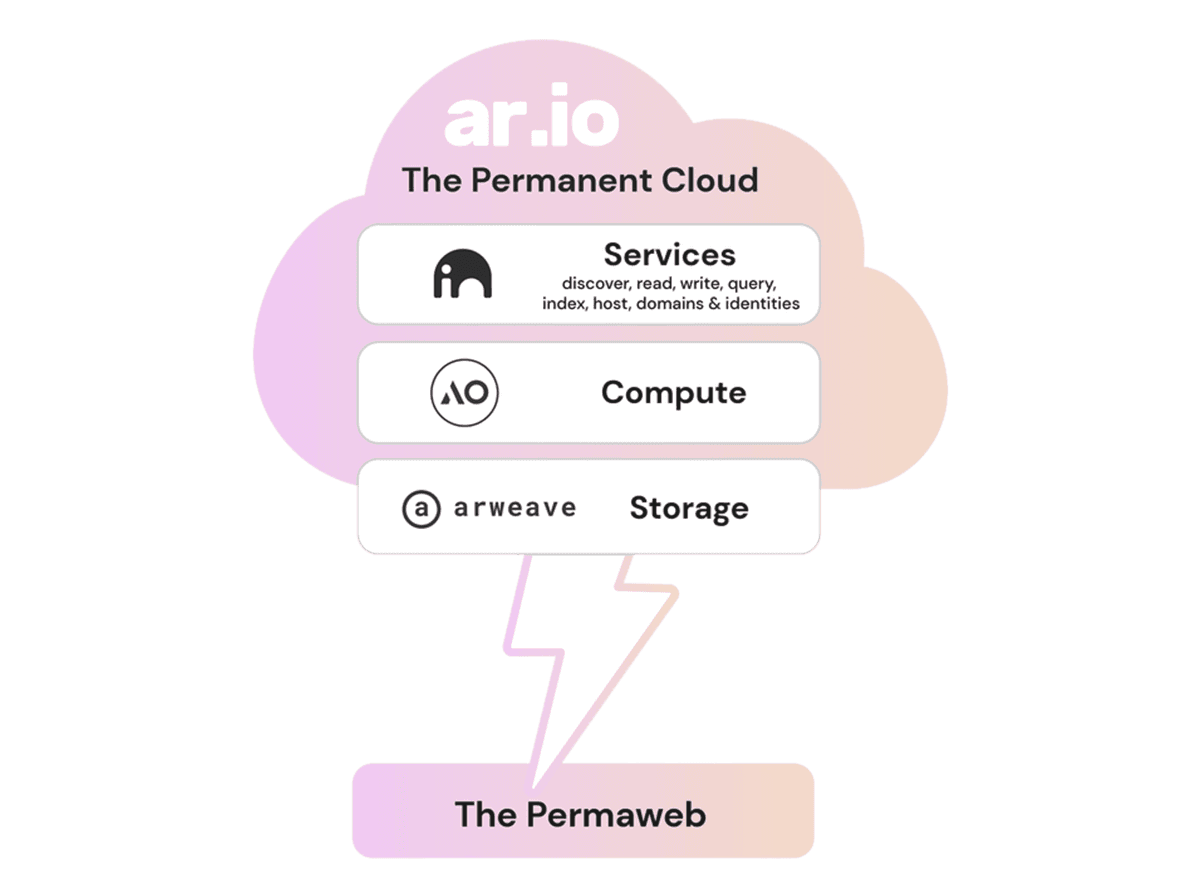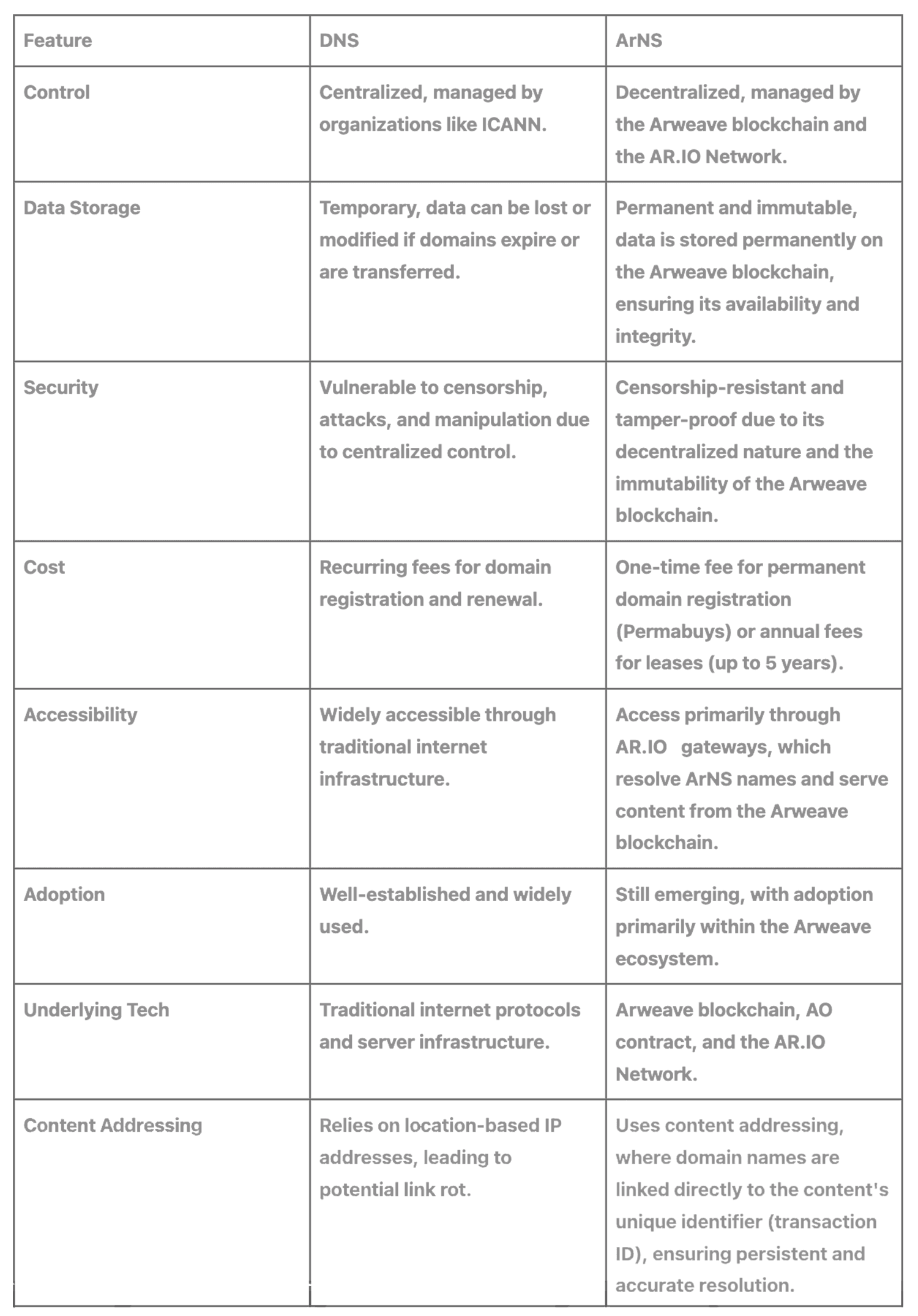
ArNS vs DNS: The Next Innovation in Domains
A comprehensive comparison of ArNS and DNS, exploring how blockchain-based naming systems offer permanence, censorship resistance, and new capabilities beyond traditional domains.
In the grand scheme of human history, the internet is new.
The internet has revolutionized the way we live, communicate, shop, learn, and work.
We have seen immense improvements to the front end of the internet. Forty years ago, text-only pages were standard and browsers didn’t exist. The type of highly-interactive sites we have now were unimaginable back then.
Another wave of improvements is taking place ‘underneath the hood', from the advent of AI tools to other infrastructure upgrades. These aim to improve on gaps and inefficiencies within the current way that the internet operates.
The internet we use today is built on an amazingly useful system, DNS (Domain Name System), which has served us well for decades, and will likely be here for decades more. It's like an old, reliable phone book, mapping domain names (like google.com ) to IP addresses.
This worked well at the start but as the internet has evolved the limitations of the system have come to light.
The fundamental weakness of DNS lies in its lack of built-in security measures, making it vulnerable to various attacks such as cache poisoning, spoofing, and man-in-the-middle attacks. Additionally, DNS's hierarchical and centralized structure, coupled with its reliance on unencrypted communication by default, creates potential choke points and single points of failure that can be exploited by attackers to disrupt internet services on a large scale.
We now need some new ways of doing things and systems that can help take the next step forward.

DNS's Limitations
DNS (Domain Name System) has served us well for decades but is now showing its age, primarily due to its centralized structure and reliance on temporary data storage.
-
Centralized Control: DNS is managed hierarchically, with ICANN at the top, overseeing domain name allocation and IP assignments. While centralization provides stability and easy management, it creates vulnerabilities.
-
Censorship: Governments or service providers can censor websites by manipulating DNS records or blocking/banning them entirely. Recent attempts by governments in Malaysia and France to censor online content through DNS highlight this issue.
-
Security Risks: Centralized DNS servers are susceptible to attacks like DDoS, spoofing, and cache poisoning, potentially disrupting internet access on a large scale. A recent security audit revealed that a significant portion of DNS servers in North America are vulnerable to a DNSSEC flaw, highlighting the risk of widespread outages.
-
Temporary Records: DNS records are typically stored on centralized servers, and their persistence depends on these servers' continued operation and the registrant maintaining their domain. Domains can expire or be transferred, leading to the loss of associated data. The maximum registration period for a domain name is 10 years, requiring constant renewals and potential price increases.
These limitations underscore the need for a more robust, permanent, and decentralized system that supports the next evolution of the internet.

ArNS: A New Paradigm for the Domain Names
ArNS is different. It’s built on the Arweave blockchain, which is a permanent and decentralized storage network. This means that websites built with ArNS cannot be taken down, censored, or lost. They are permanently etched onto the internet’s bedrock.
This system offers a compelling alternative, particularly for those seeking a censorship-resistant, low maintenance, and enduring online presence.
The core of ArNS lies in its ability to create permanent and immutable links between human-readable names and the content they represent. This is achieved through several key mechanisms:
-
Content Addressing: Unlike DNS, which relies on location-based IP addresses, ArNS uses content addressing. This means a domain name points directly to the content's unique identifier (a transaction ID), ensuring the link remains valid even if the content is moved or copied to another server. **With content addressing, all that matters is WHAT is stored, not where it is physically located.
**
-
Decentralized Registry: The ArNS registry is stored on the Arweave blockchain, a distributed network with no single point of failure. This makes it highly resilient to censorship or takedown attempts, as there's no central authority to target.
-
Permanent Storage: Arweave's blockchain ensures data permanence. Once uploaded, the content and its associated ArNS name are preserved indefinitely, eliminating concerns about content disappearing due to server shutdowns or expired domains.
ArNS & DNS: An Enhancement, Not Replacement
DNS has long been the backbone of the internet’s naming system, and ArNS builds upon it, supplementing its capabilities with the resilience and permanence of blockchain technology
In other words, ArNS works alongside DNS rather than replacing it.
Each ar.io gateway uses a DNS-based domain, like arweave.net, to resolve ArNS names - for example, ardrive.arweave.net. This integration ensures that ArNS domains are accessible using existing web browsers without requiring additional plugins or software.
This also ensures that the name system is not reliant on any single domain or TLD. Gateways can use any traditional (or non-traditional) URL, making ArNS a TLD-agnostic, 'dot anything' naming system.
While DNS resolves names to IP addresses, ArNS extends this functionality by mapping names directly to immutable content stored on the Arweave blockchain. This means that even if a hosting provider changes or goes offline, your ArNS domain remains linked to the same permanent content.
Now, let's go over some more of the differences of ArNS that you may not be used to if you have only ever used DNS.
Purchasing a Name: ArNS vs DNS
Where DNS only has the option to lease domains, ArNS offers to purchase options for domain names:
-
Leases: A user can lease a name for a specified period, with a maximum duration of 5 years. This option provides flexibility for projects with a limited lifespan or evolving needs.
-
Permanent Purchases (Permabuys): For those seeking enduring ownership, ArNS allows for permanent registration of a domain name. Once purchased, the name is linked to the content for as long as the user chooses, offering a truly lasting online presence.
Managing a Name: ArNS vs DNS
Unlike DNS which has a central registry, any domain can be managed by the owner. To manage domain ownership and settings, ArNS utilizes a smart contract-bound registry and Arweave Name Tokens (ANTs):
-
ANTs as Ownership Tokens: Each registered ArNS name is associated with an ANT Token acting as proof of ownership. The ANT owner can control various settings, including the content the name points to, its subdomains, transfer control to another, or relinquish control.
-
Subdomain Control (Undernames): ANT owners can create subdomains (called "undernames") using an underscore (_) to denote separation. This enables them to organize and manage multiple content projects under their main ArNS domain.
ArNS names are always accessible via the gateways nodes on ar.io:
-
Decentralized Gateway Network: ArNS is part of ar.io, which acts as the backbone of the permanent cloud. Ar.io is formed by a network of gateways that act as access points to the permaweb, the collection of content stored on Arweave.
-
ArNS Resolution: ar.io gateways resolve ArNS domain names - they cache and serve permaweb content, ensuring efficient and reliable access. This means that each ArNS name can resolve across an endless amount of access providers ensuring no single point of failure or manipulation.

Building the Internet of Tomorrow
ArNS represents more than just a technological improvement; it’s a key pillar of the permanent cloud. By combining the permanence of Arweave with the accessibility of ar.io gateways, it ensures that links never die, content remains unaltered, and censorship is nearly impossible.
Benefits of ArNS include:
-
Elimination of Link Rot: Permanent links ensure that content remains accessible, regardless of changes to hosting infrastructure or domain ownership.
-
Censorship Resistance: Decentralized storage and domain resolution make it extremely difficult to censor or take down content.
-
Data Integrity: The Arweave blockchain ensures that content remains unchanged, preserving its authenticity and preventing tampering.
ArNS, combined with ar.io, provides a powerful foundation for building a new generation of applications and services that are truly permanent, censorship-resistant, and user-controlled. As the permaweb continues to grow, ArNS is poised to play a crucial role in shaping the future of the internet.
Comparison Chart of DNS and ArNS

The Internet Is Evolving: Join the Revolution
As part of the permanent cloud, ArNS enables a new generation of applications and services that are truly decentralized, permanent, and user-controlled. Ar.io ties it all together, ensuring seamless access and resilience.
It’s time to take the next step with ArNS and embrace the internet of tomorrow. ArNS is leading the charge, offering a better, more permanent solution to the shortcomings of DNS.
Try ArNS today and start building the future—a web that lasts forever.